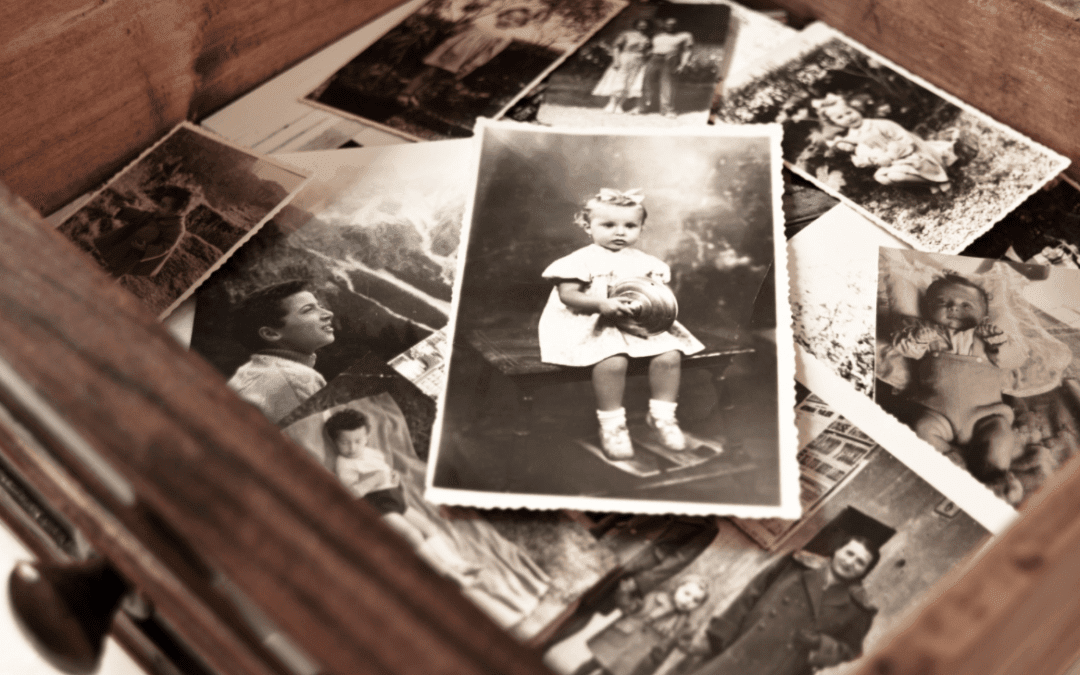You all know what a scrapbook is. It is not about throwing away scraps. It is about keeping memories alive.
I am sure more than one of you who has survived the death of your mother was surprised by … and deeply moved by … what she kept of your childhood.
Among them – firsts such as baby shoes, coloring books, report cards, mother’s day cards – maybe even your first baby tooth. Souvenirs of other milestones in your life.
All were precious to her. Later on, when she had free moments, she could take out these mementos and be transported back to those special moments in the life of the one who was the center of her life.

The Rosary as Mary’s Memories
St. John Paul, when he introduced a fourth set of memories, opps, I mean, mysteries of the rosary, wrote a section titled “Mary’s Memories”.
He reminds us Mary lived with her eyes fixed on Christ, treasuring his every word: “She kept all these things, pondering them in her heart” (Lk 2:19; cf. 2:51).
To me, that’s another way of saying she kept a scrapbook of memories in her heart.
St. John Paul wrote…
The memories of Jesus, impressed upon her heart, were always with her, leading her to reflect on the various moments of her life at her Son’s side. In a way, those memories were to be the “rosary” that she recited uninterruptedly throughout her earthly life.
She probably never saw anything like what we call a scrapbook. But if she did I would not be surprised if she had sections for memories that were joyful, sorrowful, and glorious.
Mary’s Luminous or “light-filled” memories
In establishing the Luminous Mysteries of the rosary, St. John Paul encourages us to join Mary in her memories of Jesus bringing light to the world. He singles out five moments in particular.
- Jesus’ Baptism in the Jordan when God told us that Jesus was his beloved. Listen to him.
- His self-manifestation through what John calls his first sign at the wedding feast at Cana… a sign which he performed at the intervention of his mother, first among the disciple. (What a memory to treasure!)
- His first proclamation of the kingdom of God. “The time has come, the kingdom of God is near, repent, change your way of thinking, and believe the good news.
- His transfiguration when the Spirit of God descended upon him like a dove. “This is my beloved Son with whom I am well pleased.”
- His last supper and the Eucharist when he showed them what he wanted them to do in memory of him… “wash one another’s feet”. “He loved them to the end. The Greek literally means that he loved them with the total fullness of love, even unto giving his life to show us what it means to love one another in real life.
St. John Paul continues
All of these memories were first and foremost memories of her son. The Rosary is at heart a Christocentric prayer. To recite the Rosary is nothing other than to contemplate with Mary the face of Christ.
The Rosary mystically transports us to Mary’s side as she is busy watching over the human growth of Christ in the home of Nazareth. This enables her to train us and to mold us with the same care, until Christ is “fully formed” in us (cf. Gal 4:19). This role of Mary, totally grounded in that of Christ and radically subordinated to it, “in no way obscures or diminishes the unique mediation of Christ, but rather shows its power”.
As you pray the rosary, appreciate that it is about Mary’s memories of Jesus. Memories which she pondered in her heart. We can consider the rosary as an invitation to look through her mother’s eyes at Jesus, the center of her life! Her son brought light to our world. Jesus set in motion the mother of all systemic changes.







Some very evocative sentences here…